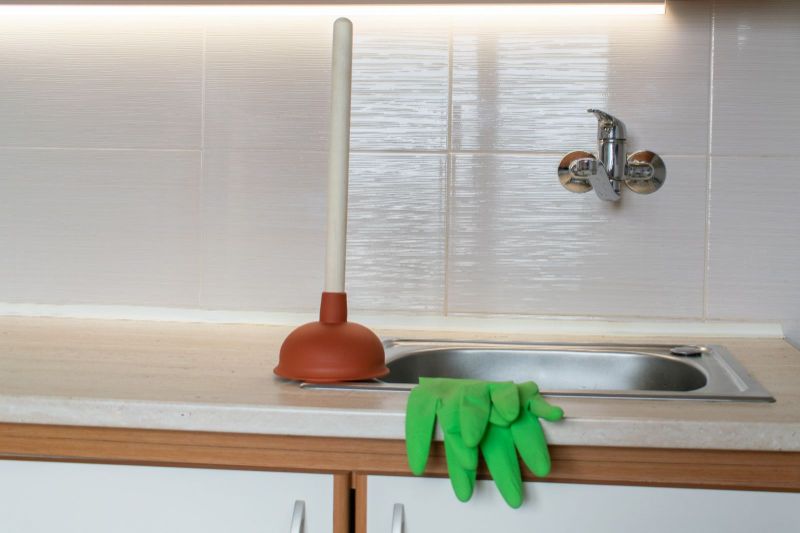Unclogging drains is frustrating for everyone involved. No one likes to deal with a clogged drain, but when a clog is nasty enough, you will probably have to do something about it.
There are several steps to the unclogging process that you need to know about so you can choose the best way for your particular condition.
The Basics of a Drain
Your drains work by allowing water in, carrying off the waste, and sending the water out of your home. A drain consists of four parts, a pipe that carries all the water from your home, a trap or seal that keeps all the water in the pipe going down, an elbow joint that directs the flow outward, and a clean-out access unit where you can access the drain if it needs to be cleaned.
The drain also has a main drain valve that controls where the water goes out and often has a bleeder valve that controls how fast the water flows.
How to Identify Clogs
The first step in solving a clogged drain is identifying what is keeping the water from moving through your pipes. The easiest way is to unplug the drain, but if that doesn't work, you should turn off all faucets in your home for about 30 minutes, then turn them back on one by one.
It will be easy to identify if the clog is coming from the faucets and drains. However, if the problem is in your pipes, the water may be low in pressure in the pipes that go to the faucets. The water pressure will be low enough to prevent the faucets from turning.
Some of these pipes are also called sumps because you can use them to eliminate wastewater that will not drain your sewer system. Many believe that a clog occurs when hair gets caught behind a drain grate and doesn't come out quickly.
There are Better Ways to Unclog Drains Than Pouring Chemicals Down Them
Some drain clogs are easy to fix. If you have a relatively moderate clog, pouring chemicals down the drain may take care of it in no time. If your drain is challenging, it will probably take more chemicals or manual work to fix it. Putting chemicals down a drain will slow the water down but not stop it.
Chemicals do not break up the clog and won't help clean up the drain. Some people like pouring chemicals into their drains because they think they suit the environment. How good these chemicals depend on which ones you use.
If you use chemicals, you should follow the manufacturer's instructions carefully to ensure the chemicals work for your situation.
How to Unclog a Moderately Clogged Drain
When a drain is moderately clogged, some of the water is not getting through because of large debris in the drain or inside it. It can be as small as a large pipe crack or caused by a mold or other material buildup.
You can unclog this drain before you take it apart if you want to use chemicals. This clog is usually very sticky and may require you to use some liquid dish soap or mechanical pumps to make the water move through.
How to Unclog a Tough Drain
It is like a moderate clog in that there is some buildup in the drain, but it is so clogged that chemicals don't work or even break it up enough to make the water move. It would help if you did your drain with an electric drain cleaner because most chemical liquid cleaners will make very little difference.
- First, put your chemical down the drain into a large bucket and add enough water to ensure the chemicals are mixed thoroughly.
- Use a special kind of electric equipment, which is made to clean drains.
- Follow the directions supplied by the manufacturer to be sure you do it right.
Sometimes it's best to call a plumber if you have this problem.
However, if you have kids who want to help and do not want them using dangerous chemicals in your home, renting the cleaner is probably best.
How to Regularly Unclog a Drain
The best way to unclog a drain is to do so regularly. It's best to get your hands on it and use a long-handled device to push down on it. It can be difficult as clogs are often almost impossible to see.
It's straightforward for a person to get their fingers stuck between the drain and the pipe or in the drain itself when they try this. If a drain is challenging to unclog because it's so slimy, use a long-handled thin wire to pull out any debris blocking the drain.
Once you get your hands on the clog, push on it with your fingers to force it through. If you ever have problems with a particular drain that you can't seem to unclog by yourself, call a plumber.
When dealing with a clogged drain, it is essential to use common sense and be careful about what you use to unclog the drain. Do not attempt to unclog a drain without reading the instructions from the manufacturer. The situation may require you to call a plumber if it is beyond your abilities.
.
